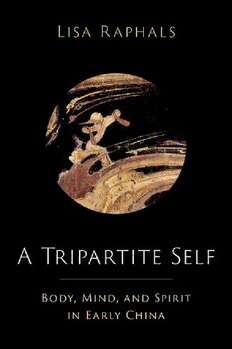
A Tripartite Self: Mind, Body, and Spirit in Early China PDF
Preview A Tripartite Self: Mind, Body, and Spirit in Early China
A Tripartite Self A Tripartite Self Body, Mind, and Spirit in Early China LISA RAPHALS Oxford University Press is a department of the University of Oxford. It furthers the University’s objective of excellence in research, scholarship, and education by publishing worldwide. Oxford is a registered trade mark of Oxford University Press in the UK and certain other countries. Published in the United States of America by Oxford University Press 198 Madison Avenue, New York, NY 10016, United States of America. © Oxford University Press 2023 All rights reserved. No part of this publication may be reproduced, stored in a retrieval system, or transmitted, in any form or by any means, without the prior permission in writing of Oxford University Press, or as expressly permitted by law, by license, or under terms agreed with the appropriate reproduction rights organization. Inquiries concerning reproduction outside the scope of the above should be sent to the Rights Department, Oxford University Press, at the address above. You must not circulate this work in any other form and you must impose this same condition on any acquirer. Library of Congress Cataloging-i n- Publication Data Names: Raphals, Lisa Ann, 1951– author. Title: A tripartite self : body, mind, and spirit in early China / Lisa Raphals. Description: New York, NY, United States of America : Oxford University Press, [2023] | Includes bibliographical references and index. Identifiers: LCCN 2022027400 (print) | LCCN 2022027401 (ebook) | ISBN 9780197630877 (hardback) | ISBN 9780197630891 (epub) Subjects: LCSH: Philosophy, Chinese. | Self (Philosophy) | Mind and body. | Dualism. | Spirit. Classification: LCC B126 .R37 2023 (print) | LCC B126 (ebook) | DDC 181/.11—dc23/eng/20220907 LC record available at https://lccn.loc.gov/2022027400 LC ebook record available at https://lccn.loc.gov/2022027401 DOI: 10.1093/ oso/ 9780197630877.001.0001 1 3 5 7 9 8 6 4 2 Printed by Integrated Books International, United States of America This book is for John Baez. Contents Acknowledgments ix Notes on Conventions, Editions, and Transcriptions xi Introduction 1 Intersecting Perspectives 2 Mind– Body and Spirit–B ody Dualism 17 A Tripartite Self 22 Plan of the Book 25 1. S emantic Fields of Body, Mind, and Spirit 29 Bodies 30 Minds 40 Spirit(s) 46 2. V irtue, Body, and Mind in the Shijing 57 Bodies in the Shijing 58 Xin 65 Spirits 72 More on Embodied Virtue 73 Conclusion 75 3. M ind and Spirit Govern the Body 76 Body, Mind, and Spirits in the Analects 79 The Mozi 83 The Emergence of Internal Spirit in the Guanzi 87 Heart– Mind as Ruler in the Mencius 92 Xunzi and the Hegemony of the Heart–M ind 98 Rulers and Ruled in the Guodian Texts 110 The Heart– Mind Is What Is at the Center (Xin shi wei zhong) 112 Heart– Mind and Spirit in the Huainanzi and Wenzi 115 Conclusion 119 4. B ody, Mind, and Spirit: A Tripartite View 121 Yang Zhu’s Discovery of the Body 122 Mind and Spirit in the Guanzi 125 The Zhuangzi 135 Spirit and Body in the Shiwen 143 The Huainanzi 149 Conclusion 157 viii Contents 5. B ody, Mind, and Spirit in the Guodian Manuscripts 159 Body, Emotion, and Heart–M ind in Humans and Animals 161 Heart– Mind and Body in the Xingzi Mingchu 166 Heart– Mind and Body in the Wuxing 176 Conclusion 179 6. B ody, Mind, and Spirit in Early Chinese Medicine 180 Mind– Body Dualism and Medical Texts 181 Shén and Xin in the Huangdi Neijing 185 Conclusion 206 Conclusions 208 Inner and Outer Reconsidered 211 Personal Identity and Persistence 215 Embodied Cognition 218 Glossary 223 Appendix 1: Time Lines 227 Appendix 2: Semantic Fields of Body, Mind, and Spirit 229 Appendix 3: The Brain in the Huangdi Neijing 231 References 239 Index 263 Acknowledgments This book is an exploration of the boundaries between body, mind, and spirit in early China. It is also part of two ongoing interdisciplinary and intercultural explorations that have informed my scholarly work. One is the engagement between the disciplines of philosophy and history—i ncluding the history of science—f rom a perspective also informed by anthropology. The other is the comparative study of Chinese and Greek antiquity from a shifting viewpoint informed by all three disciplines: this book focuses on early China, but it is part of a larger comparative project. This approach is not well recognized in the contemporary academy, and for this reason I shall always be indebted to the teachers, both formal and informal, who informed and encouraged it in diverse ways: Anthony Yu, Stephen Toulmin, Gregory Nagy, A. K. Ramanujan, A. C. Graham, Sir Geoffrey Lloyd, and Michael Loewe. These debts can never be repaid; their example can only be emulated. Several colleagues have read all or part of the manuscript at various stages: Sarah Allan, Alba Curry, Mark Csikszentmihalyi, Lothar von Falkenhausen, Martin Kern, Karyn Lai, Perry Link, Michael Puett, two anon- ymous readers from T’oung- pao, and three anonymous readers from Oxford University Press. This project has benefited from residential fellowships and financial sup- port from several institutions. I have received ongoing support from the University of California, Riverside. Committee on Research (COR) grants supported the initial preparation of the manuscript. A fellowship at the Harvard Center for Hellenic Studies was postponed by Covid but offered in- valuable library resources and Zoom seminars. Three chapters of this book draw on prior publications. Some of the early groundwork was done in Raphals 2015. Chapter 2 is an expanded version of Raphals 2021. Chapter 5 is based on Raphals 2019, and Chapter 6 is based on Raphals 2020. I have benefited from discussions with graduate students Alba Curry and Ryan Harte. The heroic librarians at the Interlibrary Loan department have been a lifeline over many years.
